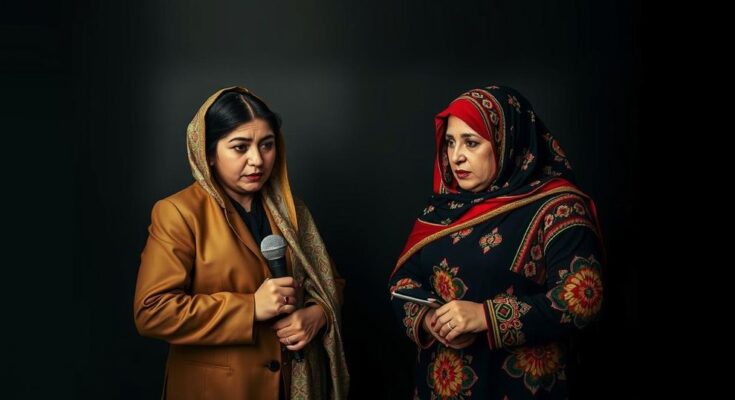Afghanistan’s Taliban regime has severely restricted women’s rights through numerous decrees since taking power, prompting international criticism for engaging with the group without women’s representation. Human rights activists argue that women’s rights should not be negotiable, with many fearing the Taliban’s oppressive measures will continue unchallenged. International discussions currently neglect these women’s issues, leading to despair among Afghan women who feel abandoned by the global community.
In Afghanistan, the question of women’s rights amid the Taliban’s regime remains alarmingly critical. Armed with over 80 decrees restricting female freedoms, the Taliban continues to erode the rights of women, denying them basic educational and professional opportunities while enforcing draconian social codes. Amid these troubling circumstances, international bodies, particularly the UN, face backlash for their inadequate responses and engagement without Afghan women’s representation. The UN’s recent meetings aimed at negotiating with the Taliban have seen the exclusion of women, leading human rights advocates to express deep disappointment. This lack of inclusion is not just an oversight; it fundamentally undermines women’s rights, which activists insist should be non-negotiable. Leaders like Nazifa Jalali, an Afghan human rights activist, voice concerns that legitimizing the Taliban without addressing these issues only emboldens their oppressive tactics. As the international community grapples with how to approach the Taliban, discussions often revolve around economic cooperation and drug trade reduction, neglecting the core issue of women’s oppression. These negotiations have done little to assure women of their rights, leaving many to fear that the situation will remain unchanged. Activists like Richard Bennett and Agnès Callamard underscore that the unyielding plight of Afghan women cannot emerge as bargaining chips in diplomatic exchanges. Jalali’s urgency and the plight of a girl facing execution for assault paint a harrowing picture of life under Taliban rule. Analysts worry that without the necessary pressure and visible commitment to reform from the international community, the cycle of violence against women will continue unabated, perpetuating what has been termed as a form of gender apartheid. As international discussions unfold, the voices of Afghan women languish unheard, reflecting a broader crisis in human rights advocacy amidst global politics.
The current situation in Afghanistan under the Taliban regime has deteriorated significantly regarding women’s rights since the group’s takeover in 2021. The Taliban has issued numerous laws that systematically restrict women’s freedoms, including barring them from secondary education and public life. International organizations like the UN find themselves in a challenging position, attempting to engage with a non-recognized government while also advocating for the basic rights of Afghan women. Despite calls for accountability, the Taliban’s oppressive actions continue, leading to widespread fear and hopelessness among female citizens.
In summary, the struggle for women’s rights in Afghanistan reflects a complex interplay between local oppression and international diplomacy. The exclusion of women from negotiations reveals a troubling trend that threatens to dismiss their fundamental rights as negotiable. Activists continue to call for a unified stand against such oppression, reminding the global community that the fundamental rights of women must not waver, especially amidst the dire circumstances present in Afghanistan.
Original Source: www.swissinfo.ch



